So, you moved to the Netherlands and worked hard to earn your degree. Now what? Many international students return to their home countries after graduation, but that is not necessarily by choice.
According to a Dutch government statistic, 70% of international students would like to stay in the Netherlands for work, but only 27% actually do. This loss of intellectual capital has become the focus of governmental action plans at both the Dutch and EU levels.
There is a growing realisation that internationalisation at all academic levels raises the quality of education and research and is essential for economic growth. Dutch universities are successful at attracting top international students, but there is a need to develop programmes that encourage them to stay beyond graduation. One such governmental programme currently being implemented is called “Make it in the Netherlands”. The main goals of this plan are to make sure all international students feel welcome, to encourage as many as possible to work in the Netherlands after graduation and to ensure that all international students maintain a bond with the Netherlands even if they return abroad.
To achieve these goals, a plan of action was laid out in 2013 and is still being executed at schools across the country. Steps include making it easier for internationals to learn Dutch, helping internationals to connect with Dutch students and society using things like buddy programmes and internationalising student bodies and societies, and trying to simplify practical matters like administrative obstacles to studying and working here.
According to Dr. Anka Mulder, Vice President for Education & Operations at TU Delft, the university is a regional frontrunner in the project. “In close cooperation with the municipality of Rotterdam we are trying to show companies not only how smooth hiring internationals can be, but also to show them the added value international talent can have for their companies,” she said. “At the same time we guide international students in their approach and route to opportunities to enhance the chances to find job-opportunities.”
Whether the programme is having a positive effect on the statistics remains to be seen. To provide some personal insight on the issue, here are the stories of five international TU Delft graduates who decided to make it in the Netherlands.
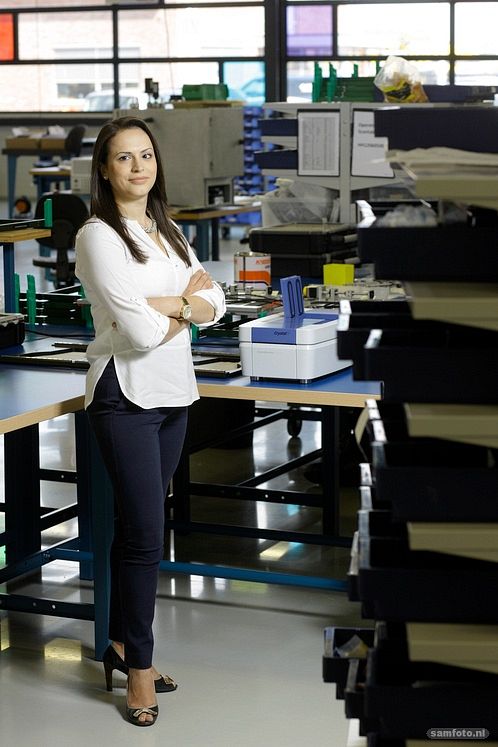

Carmen Guguta (Romania) MSc Physical Chemistry, 2004
PhD Pharmaceutical Solid State Chemistry, 2008 (Radboud University, Nijmegen) Carmen Guguta clearly remembers the day she arrived in the Netherlands from Romania. “It was raining and grey,” she said. “I didn’t think I would be able to live here because it felt so dark, so sad.” Some eleven years later, she is happily living and working here with no plans to leave.
During her undergraduate studies at Ovidius University in Romania, a TU Delft project collaboration piqued her interest in the Netherlands. Knowing that materials for research were more readily available here than at home made it an appealing opportunity. Once here, her colleagues and professors in the TU Delft chemistry department helped her to integrate, and despite her initial feelings about the weather, she ended up having what she describes as “the best experience of my life”.
After finishing a master’s, she knew she wanted to pursue a PhD and opted for Radboud University in Nijmegen, where her research was related to pharmaceuticals and solid state chemistry. During her studies, she met her future husband, a TU Delft PhD candidate from Mexico. They married halfway through their PhD programmes and now have a son together.
While working on her thesis, Guguta’s professor told her about a position with a Dutch-based pharmaceutical firm. Although she hadn’t thought much about it, in the end the decision to stay was easy. Currently employed as a Product Manager by Technobis Crystallization Systems, Guguta said that she feels like her work is meant to help people.
Fluent in Romanian, Spanish and English, Guguta continues in her quest to learn Dutch. After completing a course, she now meets with a taal coach every week to improve. “I felt a real need to speak Dutch with buying a house here and having a child here,” she said, even though she uses English at work.
Guguta and her husband think about leaving sometimes. “When we go back to our countries we realize how good we have it here,” she said. “We would consider relocation, but we are very happy here.”
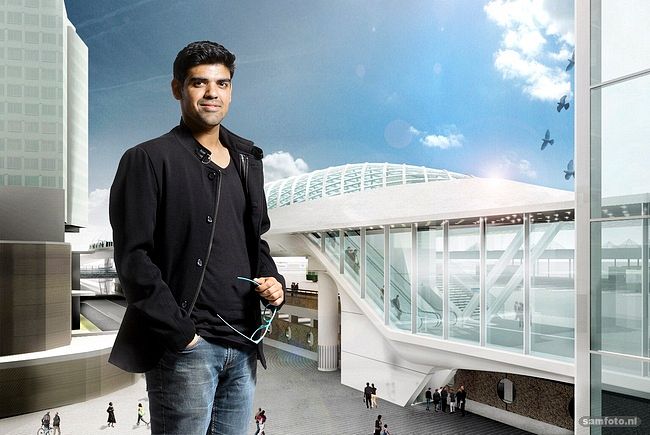

Anurag Bhattacharya (India) MSc Architecture, 2013
When the time came for Anurag Bhattacharya to go to university, he wanted to do something outside of his comfort zone. So he left central India and went 2,000 km away from home to study architecture at the National Institute of Technology Tiruchirappalli. During an internship exchange programme in Romania he met a student from TU Delft, a turning point that would take him even farther from home.
Ready for a new adventure, he enrolled in the Faculty of Architecture at TU Delft to pursue a master’s degree. Aside from wanting another international experience, part of the reason he opted for TU Delft was the flexibility to choose different studios, or modules, within the faculty. Bhattacharya’s studies were focused on non-standard and interactive architecture, as part of an innovative research group called Hyperbody. This unique form of architectural design focuses on building components and buildings becoming dynamic, acting and re-acting in response to environmental and user-specific needs. “It’s not just about walls and windows, but it’s about how a building adapts to its users,” Bhattacharya said.
Earning an impressive score of nine on his thesis, Bhattacharya decided to stay in the Netherlands after graduation. Although he hasn’t learned to speak Dutch, he found work in English as an Architect and Parametric Design Specialist for Zwarts and Jansma Architects in Amsterdam. Noting that design and construction technology here is quite ahead of that in India, he was also attracted by the healthy work/life balance enjoyed here.
For incoming international students, Bhattacharya said he would encourage them to travel a lot. “If you’re here, experience things, make diverse friends, tap into it,” he said. And what does the future hold for him? “I see myself here for some time, but I definitely want to go back to India,” said Bhattacharya. He hopes to start his own firm focusing on computational design that maintains a collaboration with the Netherlands.
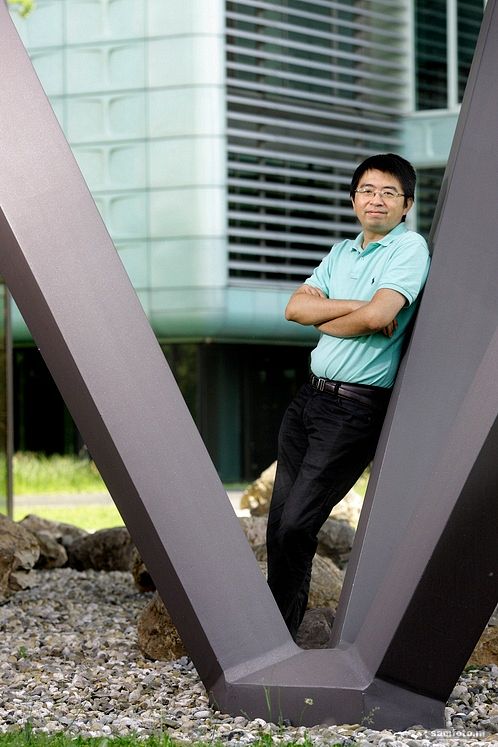

Yuxin Guan (China) MSc Media and Knowledge Engineering, 2007
Originally from Shandong province in China, Yuxin Guan came to the Netherlands in 2005 to pursue a master’s degree. A good friend had studied in the Netherlands and suggested he learn more about the educational opportunities here. From the TU Delft website, Guan was intrigued by the Media and Knowledge Engineering programme. “It was quite new and I had never seen it in another university,” he said. Although he is sad that the programme has since merged with computer science, he was fortunate to finish his degree in it.
Moving here for Guan had its challenges. The most difficult part, he said, was the language. His English was lacking when he arrived and he spent much of the first academic quarter getting up to speed. Fortunately he was able to improve enough to make lots of friends within the two-year programme. And Guan describes his academic experience at TU Delft as nothing short of amazing. “We focused on learning some really cool techniques which can change our digital life,” he said. “Lots of topics I learned from that program are still really modern even now, after 10 years, such as virtual reality and 3D visualization.”
After graduating, Guan spent a year doing research at TU Eindhoven, before landing his current job as Senior Software Engineer with ASML. His work now focuses on designing software for the next generation of lithography machines. Though he has started learning Dutch at work and said he is at a basic level, the motivation to continue is not very high because English is the common language.
After eight years of working here, Guan doesn’t see any reason to leave. “Life is quite peaceful here,” he said. “The Netherlands is a nice country for R&D and work with a pure international environment.” In 2008, along with two friends, Guan created outpie.com, an online community to help Chinese students here. Later this year Guan plans to found an online traveling platform that offers customized travel services helping Chinese people get to know the Netherlands and Europe.
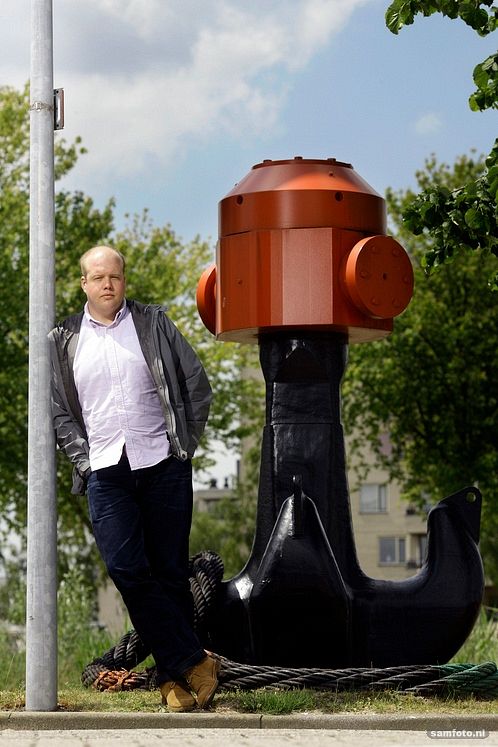

Cameron Roberts (USA) MSc Offshore Engineering, 2014
Boats and water have always been interesting to Cameron Roberts, so it was only natural that he wanted to design ships for a career. He knew he wanted to go abroad, so after finishing his undergraduate work at Florida Institute of Technology, he just had to decide where. After considering countries that were good at offshore engineering, he decided the Netherlands was the best choice. “The Dutch excel at this kind of work,” he said.
During his time at TU Delft, Roberts’ studies focused on floating structures. With an intentional plan to stay here after graduation, he took advantage of a special one-year visa that allows international grads an opportunity to find work. Roberts landed a job as a Naval Architect with a company called Seaway Heavy Lifting. The Dutch offshore contracting firm installs platforms and wind turbines for the oil & gas and renewables industries around the world.
The work environment is quite international with English being the common language, according to Roberts. Although it’s inevitable that people speak Dutch sometimes, he said it hasn’t been a problem for him so far. He did try learning Dutch while at the university, but found that the Delfste Methode didn’t work for him. With an offer from the company to sponsor him, Roberts is considering going back to learn the language.
Moving here wasn’t much of a culture shock to Roberts, who said he has always been able to adapt to new environments. He felt that TU Delft did a good job of getting the international students together, which helped his transition. Although he has met many locals, he said that most of his friends are also internationals. “I find it easy to meet Dutch people, but it’s not always easy to get close,” he said.
Roberts likes living here and said it was an easy decision to stay here. “I like the bike culture and the work climate is far more accommodating here than in the US,” he said. In the foreseeable future, Roberts intends to work toward gaining permanent residency.
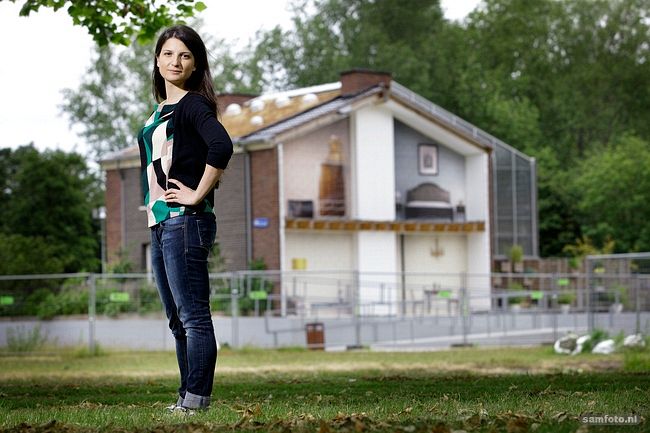

Angela Greco (Italy) MSc Civil Engineering, expected graduation 2015
Shortly after getting married in 2011, Angela Greco moved with her husband from Naples, Italy to the Netherlands . They both wanted to study abroad, but since Greco didn’t speak English only her husband was able to enroll. While he studied, Greco spent her first year here learning English. “I was a little depressed because I wasn’t studying,” she said, “but in the beginning we were in love with Delft. It was beautiful, like a dream.”
In 2012, Greco started a master’s in civil engineering at TU Delft and the following year her husband was offered a job with Shell. Only three days after the offer, Greco discovered she was pregnant and worried about the future. But with a sense of determination, she got through what she describes as “a hard year” and finished her exams before her son was born.
With a desire to learn Dutch, Greco tried classes, but found more success with a private tutor. She then accepted an internship with an agreement that the people would only speak Dutch to her, and now she is fluent. Though English is good enough in many fields, Greco felt that the ability to work in building engineering would require Dutch.
As part of the TU Delft Prêt-à-Loger team, Greco participated in the international Solar Decathalon competition in 2014, where the team won first place in the sustainability challenge. With the goal of designing a zero-energy house, the team created a solution for typical Dutch row houses. Out of this experience, Greco and two teammates have started a small business to offer design and consulting services related to home energy efficiency.
In addition, Greco worked as a coach helping other TU Delft internationals settle into life here. Although she misses warm weather, food and spontaneous visits from friends, Greco plans to continue with the life and career she is developing in the Netherlands.


Comments are closed.